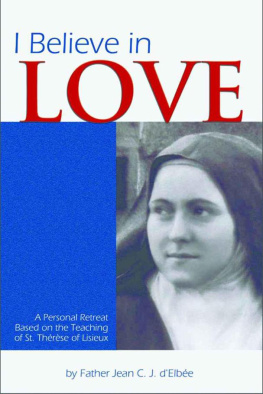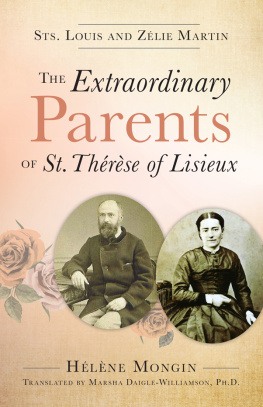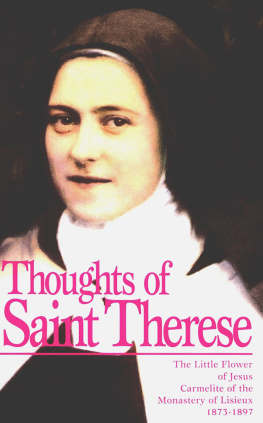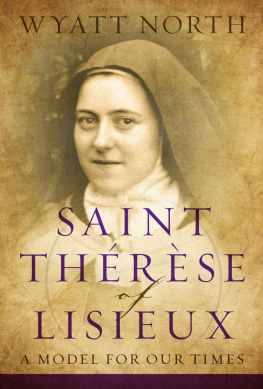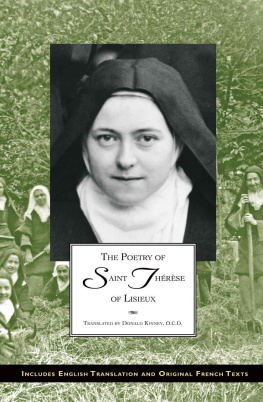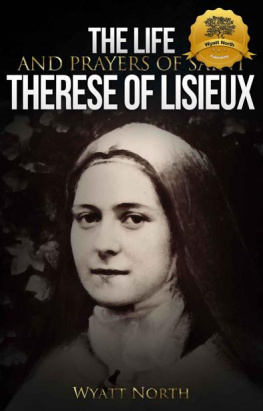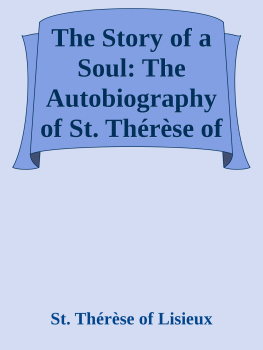
I Believe in Love
Father Jean C. J. dElbe
I Believe in Love
A Personal Retreat Based on the
Teaching of St. Thrse of Lisieux
SOPHIA INSTITUTE PRESS
Manchester, New Hampshire
I Believe in Love is an English translation by Marilyn Teichert and Madeleine Stebbins of Croire LAmour and was originally published in Chicago in 1974 by Franciscan Herald Press. This 2001 edition by Sophia Institute Press includes minor revisions to the original text.
Copyright 1969 ditions Pierre Tqui
English translation Copyright 1974 Marilyn
Teichert and Madeleine Stebbins
Printed in the United States of America
Jacket design by Lorraine Bilodeau
Jacket photograph of St. Thrse of
Lisieux Copyright Office Central de Lisieux
No part of this book may be reproduced, stored in a retrieval system, or transmitted in any form, or by any means, electronic, mechanical, photocopying, or otherwise, without the prior written permission of the publisher, except by a reviewer, who may quote brief passages in a review.
Sophia Institute Press
Box 5284, Manchester, NH 03108
1-800-888-9344
www.sophiainstitute.com
Nihil obstat: Mark Hegener, O.F.M., Censor Deputatus
Imprimatur: Msgr. Richard A. Rosemeyer, J.C.D.,
Vicar General, Archdiocese of Chicago
October 4, 1974
Library of Congress Cataloging-in-Publication Data
Elbe, Jean du Coeur de Jsus d.
[Croire lamour. English]
I believe in love: a personal retreat based on the teaching of St. Thrse of Lisieux / Father Jean C. J. dElbe; [translated by Marilyn Teichert and Madeleine Stebbins].
p. cm.
Translation of: Croire lamour.
Includes bibliographical references.
ISBN 1-928832-28-8 (pbk. : alk. paper)
1. Spiritual lifeCatholic Church. I. Title.
BX2350.2.E413 2001
248.482dc21 2001032052
01 02 03 04 05 06 07 10 9 8 7 6 5 4 3 2 1
To Mother Claire-Marie
of the Heart of Jesus
Editors note: The biblical quotations in the following pages follow the enumeration in the Douay-Rheims edition of the Old and New Testaments. Where applicable, quotations have been cross-referenced with the differing names and enumeration in the Revised Standard Version, using the following symbol: (RSV =).

Contents

To introduce this book to the reader, we quote a few words of His Holiness Pope Paul VI about divine love. In a discourse to a general audience on June 2, 1969, the Holy Father spoke as follows:
What is the discovery to which the man of faith comes when he seeks the profound and complete sense of Divine Revelation? This discovery is love. God has above all revealed Himself as being Love. The whole history of salvation, the whole Gospel is love.
We could quote so many pages of Scripture here. For example, this one comes to mind:
The Lord has appeared from afar to me. Yes, I have loved you with an everlasting love: therefore have I drawn you, taking pity on you.
The whole epic of Redemption is love and mercy, the effusion of the love of God upon us. And the history of salvation is summarized in this well-known sentence of St. Paul:
That Christ may dwell by faith in your hearts: that, being rooted and founded in charity, you may be able to comprehend with all the saints, what is the breadth and length and height and depth, to know also the charity of Christ, which surpasses all knowledge: that you may be filled unto all the fullness of God.
Let us stop here. We will have said enough about it today in celebrating two feasts[the feasts] of the Eucharist and of the Sacred Heartbeing, so to speak, driven by it toward the prophetic point which presents them and lets us savor, if not comprehend, something of their true religious sense, of their superlative and violent reality: For God so loved by Him whom we do not even know, or if we have known Him, whom we have denied and offended; if we come to the point of comprehending that we are the objects of such a love, of so great a love, we cannot remain complacent.
Such is the origin of the cult of the Sacred Heart of Jesus: let us remember that the word heart is a symbol, a sign, a synthesis of our Redemption viewed from the divine and human interior life of Christ. Jesus loved us, the Council tells us, equally with the heart of a man, and how much! Did you know that? Do you think about that? How are you going to respond?
To help us comprehend the love of God for us and to respond to it more fully is the purpose of the conferences contained in this book.
Jer. 31:3.
Eph. 3:1719.
John 3:16.
Cf. John 19:30.
The Second Vatican Council, 19621965.

My wife and I were introduced to this book while on a visit to France in 1971, and it made a deep impression on us both. It seemed then, as it seems now, to bring that nourishment for which the whole world is hungering: the divine love of the human Heart of Jesus for each single soul. In this little book, so full of the noblest and most tender sentiments, so devoid of any sentimentality, we see as if for the first time the unimaginable novelty of such familiar words as God so loved the world ; Come unto me ; This my son was dead, and is come to life again; was lost, and is found.
In a gratefully astonished surrender to this love lies the seed of the renewal and reconciliation of which the world is in need and expectation. And it is worth remarking that this love, human and divine, this charism, this rushing spirit, this soaring flame, revisited the earth in a place hidden deep within the structures of the institutional Church, which it is so fashionable to despise these days.
St. Thrse of Lisieux is the principal teacher in this book; and no one could be a better target for much of the modem jargon. Where could one find anyone more deeply buried in structure than she? She was a small member in a small community of little nuns, locked behind their medieval grille, weighed down by all kinds of rules and regulations which, we are now informed, effectively block all fulfillment of personality! St. Thrse spent her short and glorious life in what the world can see only as a dark and lifeless cave; and there Love was born and lived and shone again, as in that night in Bethlehem, and that other night on Calvary
It does not need special penetration to see that modem man has lost his way in his search for happiness, has alienated himself so profoundly from God that he has become alienated from himself, and is engaged in a sick and futile search for his own identity. What loneliness he suffers! A theme-song of desolation reverberates in his soul. He despairingly seeks guidance among those who are quite as lost as he is; and all his chosen guides lead him again to the same abyss from which there seems to be no way of return. In the end, suicide presents itself as the logical answer to those who choose this broad pathas modern literature and the newspapers bear witness.
This book comes like heavenly music, saving music, to fill with hope the emptiness of mans heart and to fill it to overflowing.
I Believe in Love is a guide to happiness based on the teaching of one who found it entire: St. Thrse of Lisieux. It is also a frame for a simple and universal program of spiritual renewal for the laity. God, through His Council, has announced to us the universal vocation to holiness. If we reply in unconditional and loving confidence, Behold the servants of the Lord; be it done to us according to Your word, the result will be what it always is in such cases: again and again the Word, having become flesh, will dwell among us. Fiat!
Next page
